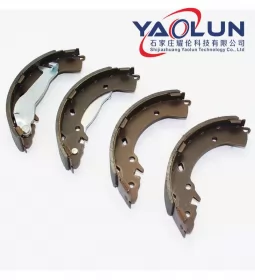Understanding Brake Shoes: A Comprehensive Guide
Brake shoes play a crucial role in the braking system of a vehicle, providing the necessary friction to slow down or bring the vehicle to a complete stop. This comprehensive guide aims to provide you with a detailed understanding of brake shoes, including their purpose, construction, working principles, maintenance, and more.
What are Brake Shoes?
Brake shoes are an integral part of drum brake systems, commonly found in the rear wheels of many vehicles. They are curved metal plates lined with friction material, which come into contact with the brake drum when the brakes are applied, generating the necessary friction to stop the vehicle.

Types of Brake Shoes
There are two main types of brake systems: drum brakes and disc brakes. Drum brakes utilize brake shoes, while disc brakes use brake pads. Brake shoes in drum brake systems can be classified into two designs: leading shoe and trailing shoe. Each design has a specific arrangement of the primary and secondary shoes within the brake drum.
Brake Shoe Construction
Brake shoes consist of several components. The main structural component is the backing plate, which provides rigidity and support. Attached to the backing plate is the friction lining, made of a heat-resistant material like asbestos-free organic, semi-metallic, or ceramic compounds. Other hardware components include return springs, hold-down springs, and adjusters, which help in proper operation and adjustment of the brake shoes.
Working Principles
When the brake pedal is pressed, hydraulic pressure is applied to the wheel cylinder, forcing the brake shoes to move outward against the brake drum. The friction linings on the brake shoes create friction against the rotating brake drum, generating heat and converting kinetic energy into thermal energy. This frictional force slows down or stops the vehicle. The primary shoe, positioned towards the front of the vehicle, usually carries a greater load during braking.
Signs of Worn Brake Shoes
Worn brake shoes can exhibit various symptoms. These include squeaking or grinding noises, reduced braking performance, longer stopping distances, a pulsating brake pedal, or an illuminated brake warning light. Regular inspection of the brake shoes is essential to identify signs of wear, such as thin or cracked friction linings. Addressing these signs promptly is crucial for maintaining safe braking performance.
Brake Shoe Replacement
Brake shoes have a finite lifespan and require replacement when they are worn beyond the specified limit. Replacement intervals vary depending on driving conditions and individual vehicle usage. If you notice signs of worn brake shoes or during routine brake maintenance, it is essential to follow proper replacement procedures. It is recommended to consult the vehicle's service manual or seek professional assistance for accurate replacement and adjustment.
Brake Shoe Maintenance
Proper maintenance of brake shoes is essential for optimal performance and longevity. This includes periodic cleaning to remove dust and debris, lubrication of the contact points, and adjustment of the brake shoe position. Regular inspection of the hardware components, such as springs and adjusters, is also necessary to ensure they are functioning correctly. Following the manufacturer's guidelines and best practices will help extend the lifespan of brake shoes.
Upgrading Brake Shoes
For high-performance or specialized applications, upgrading brake shoes to performance-oriented options may be considered. Performance brake shoes are designed to provide enhanced stopping power, improved heat dissipation, and durability. However, it is crucial to ensure compatibility with the braking system and follow the manufacturer's recommendations to achieve the desired results.
Conclusion
Understanding brake shoes is crucial for every vehicle owner. With this comprehensive guide, you now have the knowledge to identify signs of wear, perform maintenance, and make informed decisions regarding brake shoe replacement or upgrades. More details please contact Brake Shoe Manufacturer



